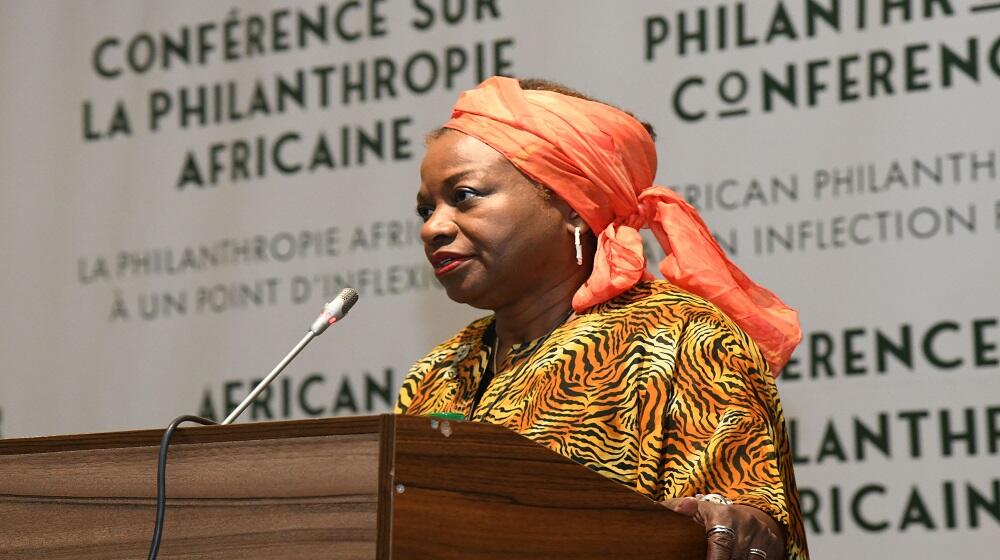DAKAR SENEGAL, 4 August 2023 - Philanthropic organizations are instrumental in advocating for increased support and funding for Sexual and Reproductive Health and Rights (SRHR) contributing to health system improvements and empowering women and girls to have more choices and autonomy emphasized Dr Natalia Kanem in her keynote address at the 4th annual African Philanthropy Conference, held in Saly, Senegal on 2-4 August.
Such support is of vital importance to focus on young people's empowerment to give them opportunities and the right to choices in their lives.
Philanthropy
The conference, organized by TrustAfrica and the Wits Business School, brought together stakeholders from diverse sectors, including government representatives, civil society, and private sector leaders, recognizing the importance of collective efforts to achieve sustainable development goals.
In her address, Natalia Kanem commended the conference organizers for recognizing that global development cannot be attained until all individuals have control over their bodies and futures.
Drawing attention to the historic 1994 International Conference on Population and Development in Cairo, Ms. Kanem praised the global consensus that placed individual rights and choices, including family planning, at the heart of development. Notably, she acknowledged the considerable progress made in advancing maternal health and access to modern contraceptives.
However, amidst these achievements, UNFPA’s Executive Director highlighted the fragility of the gains and the pressing need to continue the fight for sexual and reproductive rights for everyone. "In Sub-Saharan Africa, 553 women die every day from complications related to pregnancy and childbirth. This represents 70% of global maternal deaths (2020), which amount to about 800 per day. Most of these deaths are entirely preventable. We have seen progress in recent decades, but iimprovements in maternal health have been uneven, both within and among countries, and the pace of progress is far too slow," she said.
Adolescent pregnancies also remain a critical concern, primarily driven by social
The UNFPA's 2022 State of World Population report revealed alarming statistics, stating that nearly half of all pregnancies worldwide are unintended, leading to unsafe abortions, primarily in developing countries. Ms. Kanem underscored that sexual and reproductive health care is not a luxury but a
The UNFPA is dedicated to achieving three transformative results: ending preventable maternal deaths, addressing unmet family planning needs, and eliminating gender-based violence and harmful practices like female genital mutilation and child, early, and forced marriage.
To achieve these goals, Ms. Kanem stressed the need for increased investments in comprehensive life course approaches to sexual and reproductive health, ensuring universal health coverage, improved quality of care, skilled human resources, and accessible supplies and equipment.
"The majority of countries with a high burden of maternal mortality in Africa have less than 80% of skilled birth attendants. More investments are needed to ensure a comprehensive life course approach to sexual andreproductive health and right universal health coverage for improved quality of care, human resources for health, supplies and equipment, and accountability. Unfortunately, we see a marked decline in funding for sexual and reproductive health and rights. This despite ample evidence showing that such investments are not only the right thing to do; they make sound economic sense," she said.
During her address, the Executive Director also emphasized the importance of policies that promote inclusivity, reduce discrimination, and invest in human capital. Women's access to quality sexual and reproductive health care directly influences their participation in economic life, and research demonstrates that delaying childbearing can have significant social and economic benefits.
"UNFPA and our academic partners estimate that more than $115 billion is needed over the next 10 years to end preventable maternal death in 120 priority countries, which account for 99% of all maternal deaths. Of this amount, more than $103 billion in new investments are needed.
Millions of lives could be saved each year by investing adequately in maternal health interventions, such as helping women give birth in health facilities with trained assistance. Major challenges persist in ensuring adequate access to quality services, targeting those in
greatest need, and scaling up proven evidence-based interventions. Ensuring that the supply chain reaches the last mile and that there are adequate human resources, particularly midwives,
to provide sexual and reproductive health care to their full scope and across the continuum – these are huge challenges," she said.
"It is vitally important to have the right policies in place to reduce discrimination and create the conditions for more inclusive growth. This includes greater and more equitable investments in human capital. We want every girl to be able to stay in school and gain the skills she needs to succeed, " she added.
Ms. Kanem also recognized the vital role of African philanthropy in supporting SRHR efforts. The continent's philanthropic landscape is evolving rapidly, with foundations emerging as key partners.
The generosity of Africans, including private donors, has been remarkable during crises like the COVID-19 pandemic.
"For us at UNFPA, we see foundations and philanthropy as key partners in achieving the SDGs and a better future for women and girls globally. The role of philanthropy is not to fill funding gaps: Philanthropy’s role is to point out the gaps, to think systemically, to advocate for solutions. We have strategic partnerships in place with global philanthropies focused on SRHR," she said.
In closing, Ms. Kanem urged increased collaboration with grassroots organizations, youth, and women-led movements to address SRHR challenges, ensuring that no one is left behind. She underscored that philanthropy's role is not only to fill funding gaps but also to advocate, think systemically, and champion solutions.


